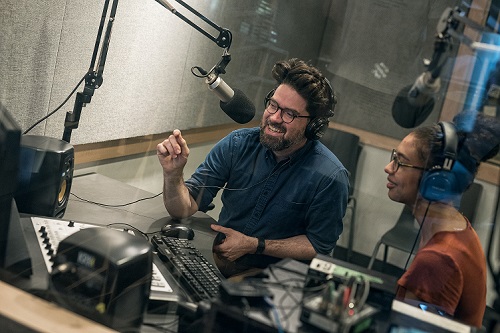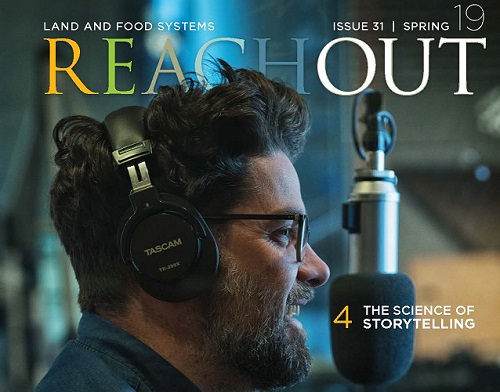The Science of Storytelling

LFS 400 (Audio Storytelling) is not your typical science course.
In fact, course instructors Duncan McHugh, Digital & Instructional Media Producer in the Learning Centre, and Will Valley, an Instructor in the Faculty, encourage students from all disciplines to enroll.
“LFS 400 is a science communications course, disguised as a podcasting course,” McHugh said. “Students learn to effectively communicate their research to audiences that may not have a scientific background, which is a particularly important skill if they wish to pursue graduate studies.”
The first assignment of the term is a vox pop, where students are tasked with approaching people on the street and asking
for their opinion. They also record the encounter using audio equipment. For many students, it may be their first experience doing both.
“Some students find themselves outside of their comfort zone at first,” McHugh notes. “But we cultivate a welcoming and
open space in the classroom that’s free of judgement. Every assignment is practiced in the classroom first. Then after they
return, the students listen to each other’s work and provide constructive feedback and encouragement.”
Joyce Liao, a fourth year student in the Global Resource Systems program, took LFS 400 in her second year and found it to be a new and exciting experience. “I saw the value in each project, and how my skills were being built up over time,” Liao said. “There is a good balance of technical components and creative work, from using equipment and learning to edit audio, to interviewing and listening skills.”
The course began as a collaboration with the School of Journalism in 2005, before morphing into LFS 400 in 2009. It is offered every winter term and is open to all UBC students, but with only 20 seats it often fills up quickly.
UBC’s campus radio station, CiTR 101.9 FM, partners with McHugh and Valley to provide access to their studio for some recording.
The major assignment is a 10-12 minute podcast, the subject of which is the students’ own choosing. “The topics students
choose to investigate often map directly onto the different disciplines and fields of study in our faculty: animal welfare,
nutrition, food insecurity, sustainable agriculture, and community development,” said Valley. “Students get an opportunity to dig deeper into an issue they are passionate about, and at the same time, learn about other issues through listening to their peers’ final podcasts.”
On the final day of term, all students participate in a listening party, where they present their podcasts to the class. “It’s an incredible opportunity to recognize how far the students have come since the first day, when many of them have had little experience in storytelling. We often hear in the feedback that this course has provided them with the most opportunities to be creative during their undergraduate degree,” said McHugh.
“It may be unlike any other course they have taken before, but the experience and skills they learn are very applicable to their careers after university.”
The podcasts have a permanent home on the course website, lfs400.landfood.ubc.ca, where anyone is free to listen.
